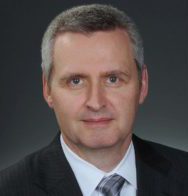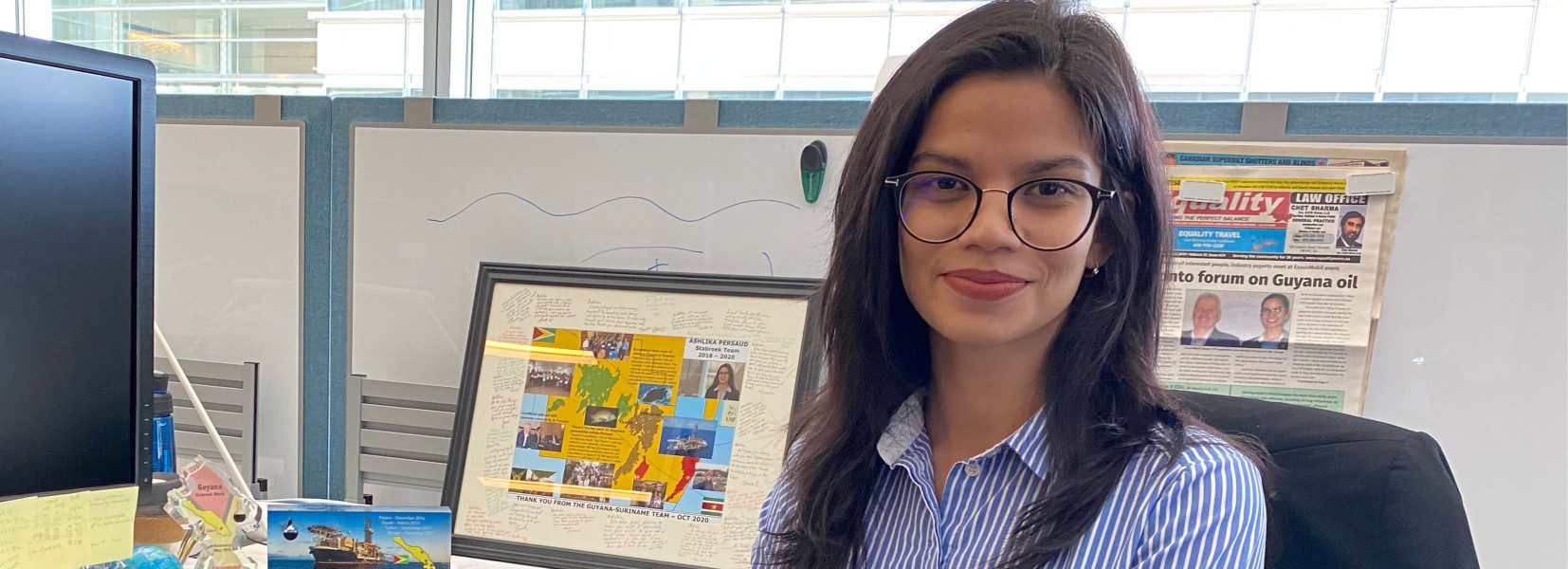Guyanese geoscientist Ashlika Persaud says she has a deep desire, and that is to do right by her company – ExxonMobil – and her country, where the discovery of massive amounts of oil since 2015 has placed the South American nation on a growth trajectory unprecedented in its history.
“In a developing nation like Guyana, parents and teachers want children to rise above and improve the standard of living there,” she told Senior Vice President at ExxonMobil, Michael G. Cousins during a recent conversation. “There were several teachers in secondary school who strongly encouraged me to focus on STEM studies, as they believe a STEM-focused education offers that pathway to success.”
Ashlika recounted how she began her career with the company working on seismic modeling on the West-Africa opportunities team, after which she joined the Guyana exploration team as the lead geoscientist evaluating multiple oil prospects.
“Making my first discovery at the Tilapia-1 well was one of the most rewarding experiences. As a Guyanese working at ExxonMobil, I felt so much pride and a great sense of accomplishment that I did not anticipate so early in my career,” she said, “I was being congratulated by persons within the company and friends and family back home.”
She said in one instance, her supervisor, Erik Jackson, had approached her noting that Tilapia-1 had encountered the highest net pay, at the time, surpassing the Liza wells.
“I truly grasped the impact this discovery had on Guyanese after traveling to Canada for a town-hall with you,” she told Cousins. “We spoke to the Guyanese diaspora on the company’s success and local integration. So many Guyanese there were congratulating me on all that I had achieved. I realized that same sense of pride and accomplishment I felt, had also resonated with them.”
The Tilapia success was just the tip of the iceberg for Ashlika, who grew up in Georgetown, Guyana’s capital. She started college in the U.S. in 2013 and after graduating, joined the geoscience team at ExxonMobil.
“After making three discoveries at the Tilapia, Tripletail and Pinktail wells, success for me extends beyond personal career achievements,” she said. “It means balancing my responsibility as a Guyanese geoscientist at ExxonMobil with the desire to do right by my company and my country.”
Ashlika said every day she is reminded of how lucky she is to have a job that she loves and to be part of a motivated team that’s making a difference in her life and the lives of the people she cares about.
In a comment to OilNOW, Ashlika’s father, Patanjilee Persaud, said he would like to join Cousins in congratulating the young geoscientist on her three discoveries to date.
“We hope that this serves as an inspiration for so many young Guyanese who look forward to playing an important part in our oil & gas industry. We would like to thank Exxon for giving you this opportunity and hope that other companies in the O&G sector can move swiftly in this direction in giving other young Guyanese a chance to showcase their talents,” he said.
See below for the full conversation between Ashlika Persaud and Michael Cousins
Our Guyana investment is producing more than just energy – it’s providing inspiration

At ExxonMobil, we talk a lot about the special relationships we forge with our host countries. But given the breadth and scope of our investment in Guyana since our first discovery in 2015, it can be hard to grasp the true connections we make and the relationships we build.
I’ve met plenty of fascinating individuals while working at ExxonMobil, and I can’t say enough great things about the people I’ve gotten to know in Guyana. Ashlika Persaud has the distinction of fitting into both of those categories. As a young geologist who grew up in Guyana and went to school in Florida, she has become one of the key geoscientists in Houston exploring and developing oil resources in her home country.
I recently had a chance to catch up with Ashlika to talk about her story and how it’s been shaped by the work we’re doing in Guyana. Here’s some of our conversation:
How did your experiences growing up in Guyana help to influence your interest in geoscience and STEM studies?
As a young girl, I often visited my dad at the gold and diamond mining operations he ran with his brothers. Never mind the precious gems, I was intrigued by the rocks, which I gathered and labeled as part of a collection I kept at home. Needless to say my interest in geology was piqued at a young age
In a developing nation like Guyana, parents and teachers want children to rise above and improve the standard of living there. There were several teachers in secondary school who strongly encouraged me to focus on STEM studies, as they believe a STEM-focused education offers that pathway to success.
And how has the education system changed from when you were growing up to now?
Some schools now offer a variety of courses geared towards the energy industry. The University of Guyana has introduced diplomas and master’s programs in areas such as petroleum engineering, renewable energy, and natural resources management that provide a foundation for a career in the oil sector.
It is remarkable to see how the education system is evolving, but there’s more to be done to ensure the opportunities of the growing energy industry are available to all Guyanese.
Your studies brought you to the U.S. for college. How did that move affect your career path?
I initially enrolled in the biomedical program at the University of South Florida. After taking my first set of geology classes during my initial year, it rekindled my interest and passion I had for geoscience growing up. That, and with ExxonMobil’s first discovery offshore Guyana, it made a career in geoscience possible, and provided an excellent opportunity to impact the socio-economic wellbeing of those back home.
Being part of a major discovery is a milestone in anyone’s career. What was that experience like for you?
I began my career with the company working on seismic modeling on the West-Africa opportunities team, after which I joined the Guyana exploration team as the lead geoscientist evaluating multiple oil prospects.
Making my first discovery at the Tilapia-1 well was one of the most rewarding experiences. As a Guyanese working at ExxonMobil, I felt so much pride and a great sense of accomplishment that I did not anticipate so early in my career. I was being congratulated by persons within the company and friends and family back home.
In one instance, my supervisor, Erik Jackson, had approached me noting that Tilapia-1 had encountered the highest net pay, at the time, surpassing the Liza wells.
I truly grasped the impact this discovery had on Guyanese after traveling to Canada for a town-hall with you. We spoke to the Guyanese diaspora on the company’s success and local integration. So many Guyanese there were congratulating me on all that I had achieved. I realized that same sense of pride and accomplishment I felt, had also resonated with them.
Large-scale international operations rely on the support of both local people and expatriates. How has Guyanese culture played a role on your team?
It’s easy to get caught up in day-to-day activities, given the pace at which we’re moving and the magnitude of our operations in Guyana. But something as simple as the game of cricket showed everyone how easy it is to integrate a concept like safety across the different cultures.As some may know, we Guyanese are very passionate about cricket, so we had a bat and ball shipped to Houston and used the equipment as a safety-themed team building opportunity. Everyone signed the bat as a commitment to the local safety culture.
The Caribbean lifestyle is very easygoing, but it also has a very direct “work hard, play hard” mentality. To some degree, that culture and the Guyanese sense of community have transferred over to both our local office and our office in Houston.
I’m also very happy that ExxonMobil supports the Amazon Warriors national cricket team in the Caribbean Premier League. Cricket, and by extension the Warriors, continues to be a source of social cohesion in Guyana.
Guyana has one of the fastest growing economies in the world. How are you seeing this growth take hold at a local level?
I can’t stress enough how many opportunities have come just from the oil and gas industry. Between ExxonMobil, contracting companies and the Centre for Local Business Development (CLBD), the engagement between these entities and the local workforce is impressive. The CLBD has also stewarded programs in areas like women’s empowerment and entrepreneurship, youth development, technology and safety, which allows locals to partner with companies like Saipem or Technip FMC. This investment in Guyana has allowed us to engage with more than 800 local suppliers, and continually build local capacity.
You met Dr. Bharrat Jagdeo, vice president of Guyana, at Offshore Technology Conference in Houston last year. What did you take away from that engagement?
It was fascinating to hear his plans for the country’s growth and how ExxonMobil’s success is such a critical part of that. From the planned developments for future discoveries to the revenue that will directly feed back into the country and support the people there, it gave me a sense of pride to know that I’m working with a company as big as ExxonMobil, which is spearheading and stewarding these efforts.
What’s your definition of success? And how does that mindset keep you excited about your job?
After making three discoveries at the Tilapia, Tripletail and Pinktail wells, success for me extends beyond personal career achievements. It means balancing my responsibility as a Guyanese geoscientist at ExxonMobil with the desire to do right by my company and my country. Every day, I’m reminded how lucky I am to have a job that I love and to be part of a motivated team that’s making a difference in my life and the lives of the people I care about. Like so many within the company.




